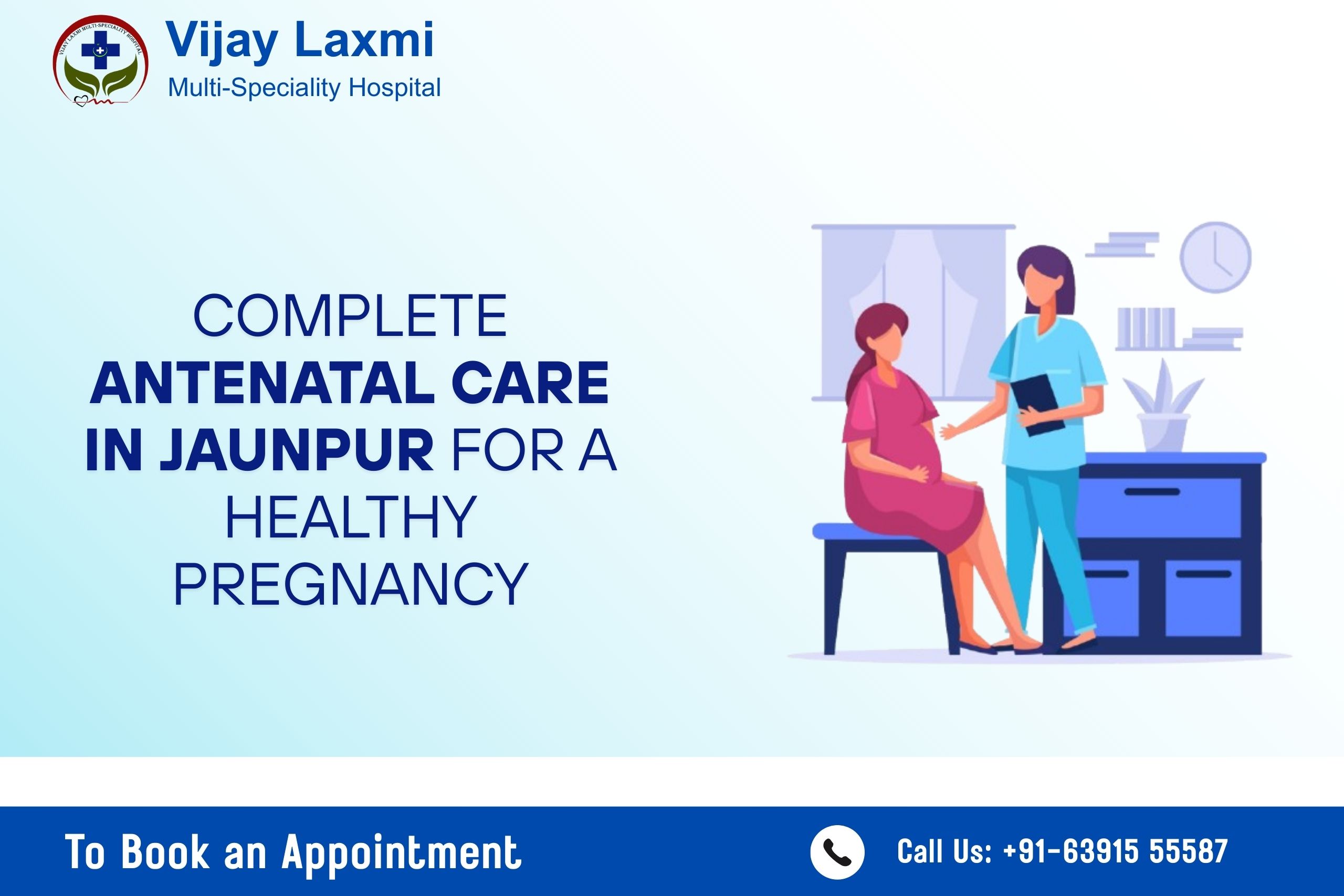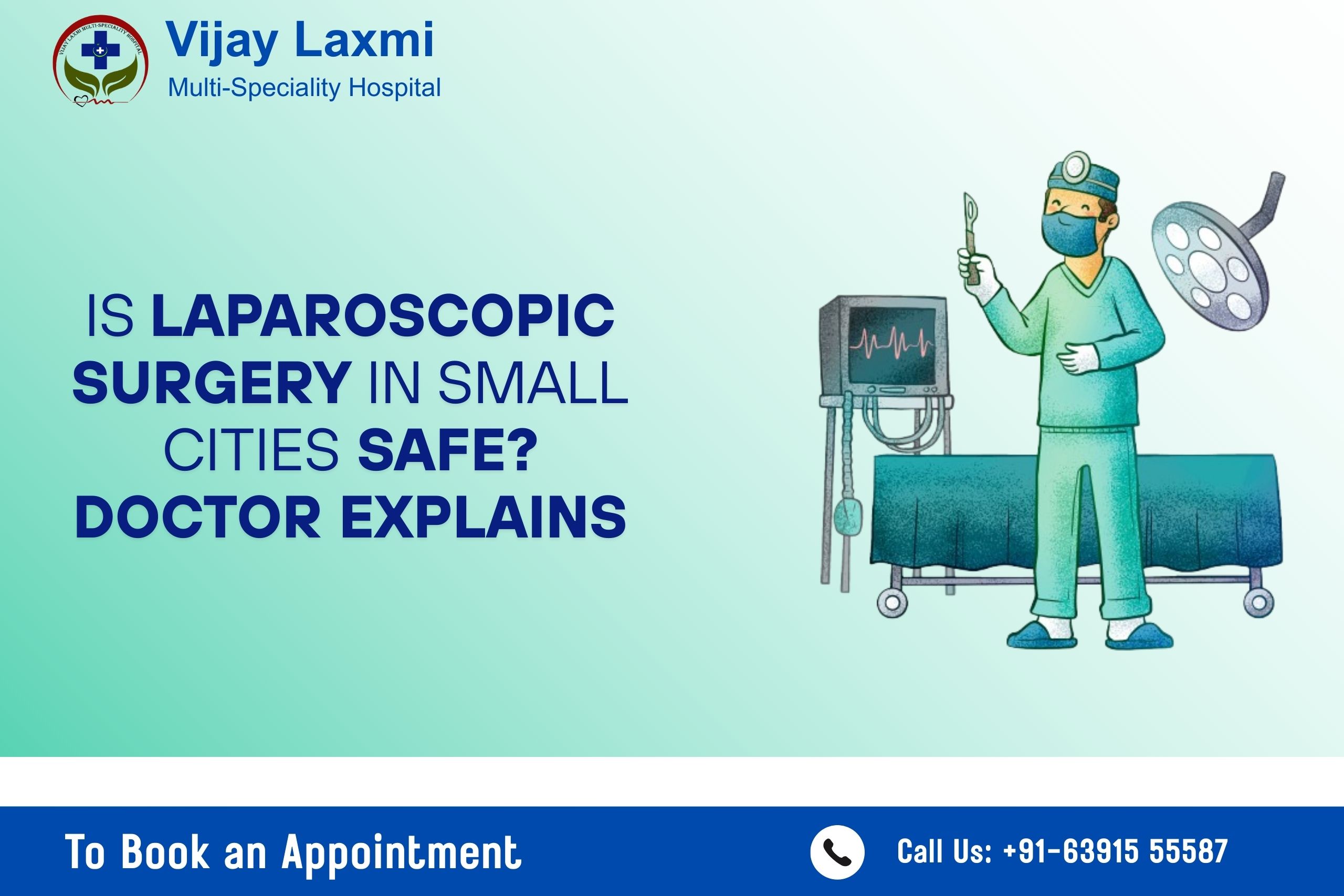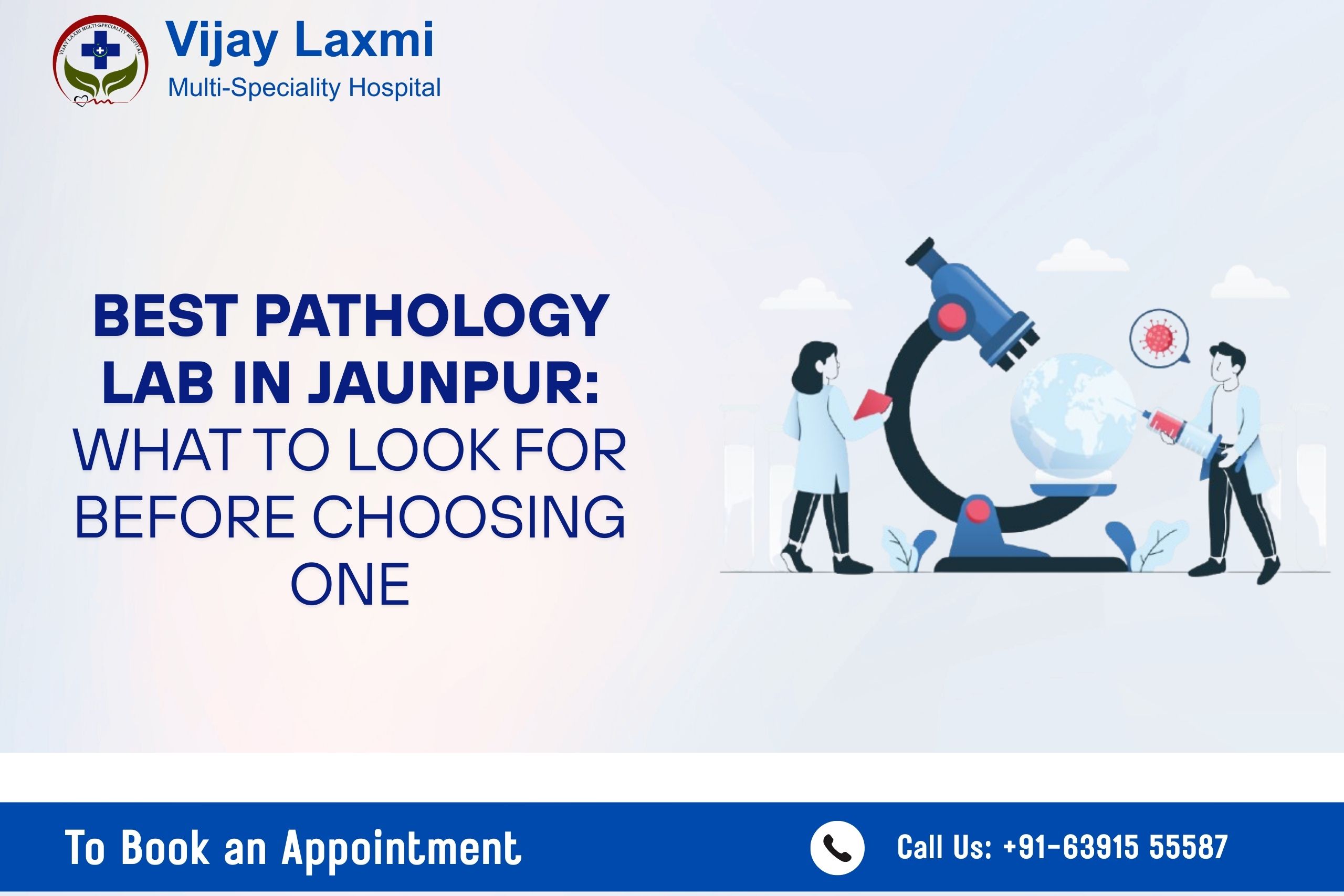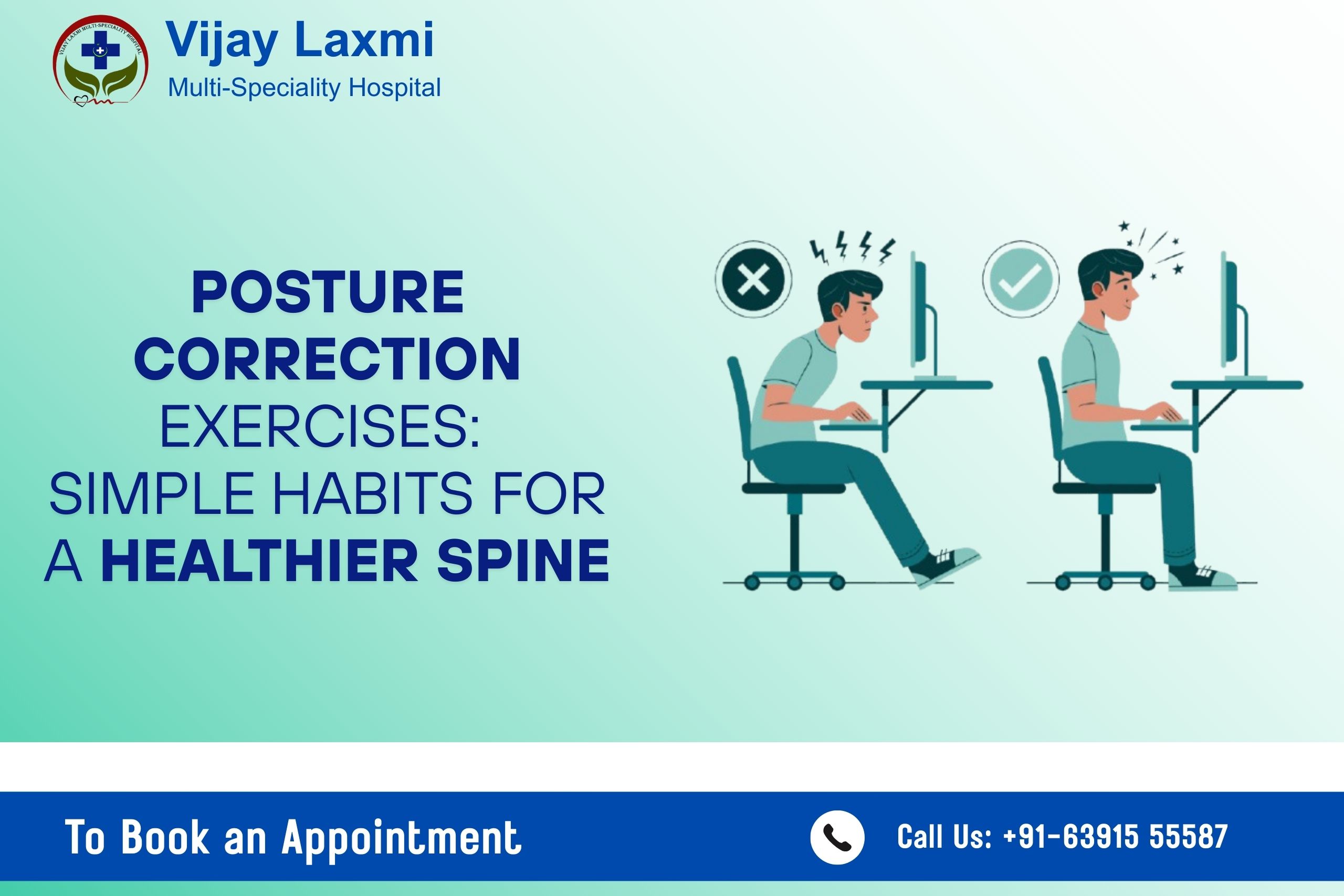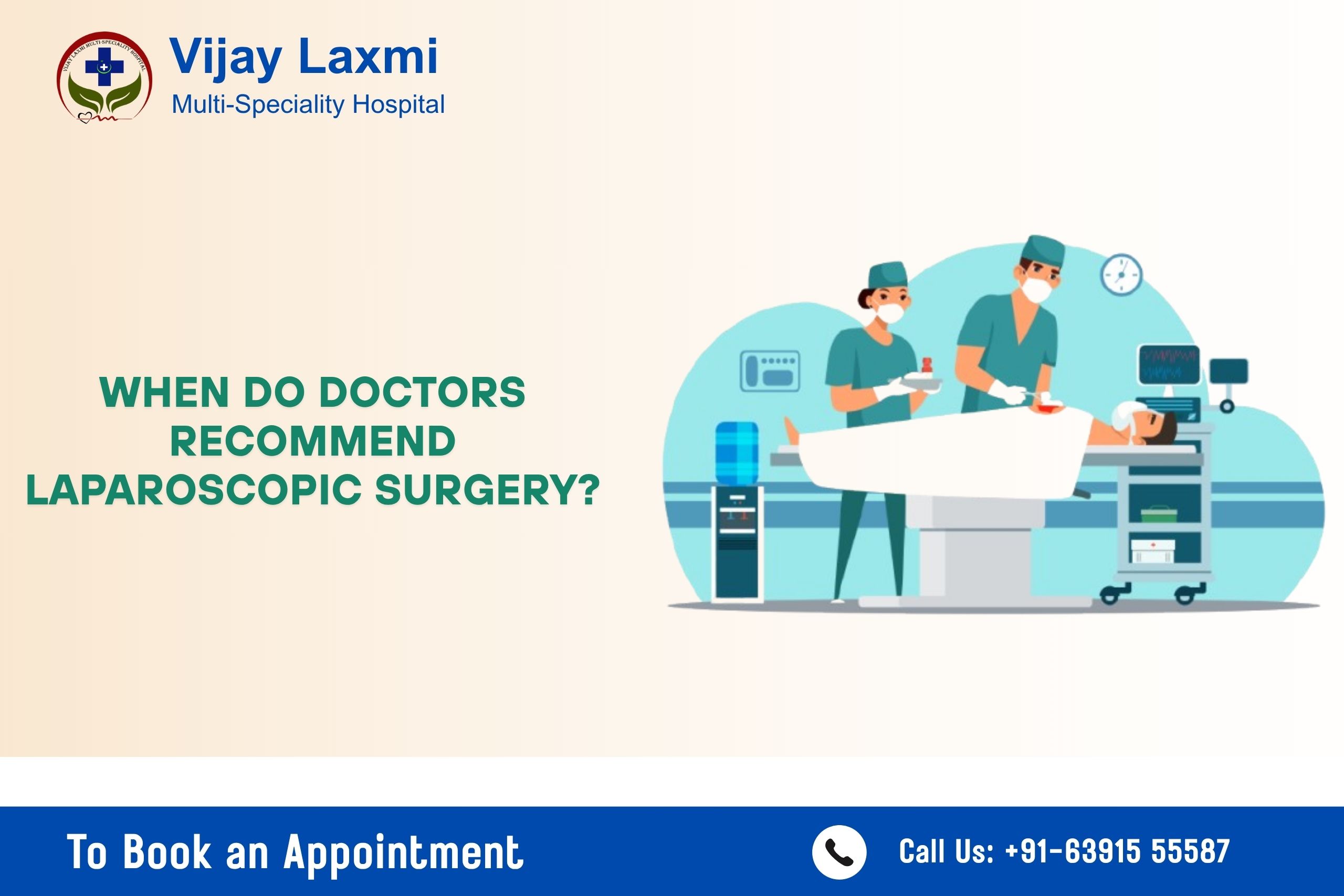
When Do Doctors Recommend Laparoscopic Surgery?
Modern surgery has undergone a major transformation over the past few decades, with laparoscopic surgery emerging as one of the safest and most advanced techniques. Unlike open surgery, which requires large incisions, laparoscopic surgery uses tiny cuts and specialized instruments to treat internal organs with minimal trauma.
At Vijay Laxmi Multi-Speciality Hospital, Jaunpur, Dr. Vishad Patel, a leading laparoscopic surgeon in Jaunpur, performs a wide range of laparoscopic procedures that help patients recover faster and with fewer complications.
But patients often wonder when do doctors recommend laparoscopic surgery? or what are the indications for laparoscopic surgery?
In this detailed guide, we’ll explain the medical conditions, diagnostic needs, and treatment scenarios where laparoscopy is the preferred approach, along with its advantages and recovery expectations.
What Is Laparoscopic Surgery?
Laparoscopic surgery, also called minimally invasive surgery, involves inserting a small camera (laparoscope) and surgical instruments into the body through small incisions. The camera provides a clear, magnified view of the internal organs on a monitor, allowing the surgeon to perform procedures precisely without the need for large cuts.
It’s widely used across multiple specialties including gastrointestinal surgery, gynecology, urology, and general surgery.
Compared to traditional open surgery, laparoscopic surgery offers:
- Smaller incisions and less scarring
- Shorter hospital stays
- Reduced pain and bleeding
- Faster recovery and return to normal life
No wonder Dr. Vishad Patel and many experienced surgeons across India now recommend laparoscopy as the first choice for suitable patients.
Understanding the Indications for Laparoscopic Surgery
The indications for laparoscopic surgery vary depending on the organ system and the underlying condition. Doctors typically recommend this method for both diagnostic purposes (to examine inside the abdomen) and therapeutic purposes (to treat specific problems).
Let’s explore the most common medical situations where laparoscopic surgery is used.
1. Gallbladder Diseases (Laparoscopic Cholecystectomy)
When It’s Recommended:
- Gallstones causing pain, infection, or inflammation (cholecystitis)
- Bile duct obstruction
- Gallbladder polyps or dysfunction
Why Laparoscopy:
Laparoscopic gallbladder removal is one of the most commonly performed surgeries worldwide. It helps relieve pain, prevent future attacks, and restore normal digestion.
Patients at Vijay Laxmi Multi-Speciality Hospital often choose Dr. Vishad Patel for this procedure due to his expertise and the hospital’s advanced laparoscopic technology.
2. Appendix Inflammation (Laparoscopic Appendectomy)
When It’s Recommended:
- Acute or chronic appendicitis
- Suspected appendix rupture or abscess
Why Laparoscopy:
A laparoscopic appendectomy allows faster recovery and less post-operative pain than traditional surgery. It also offers a better cosmetic result, which is especially important for younger patients.
3. Hernia Repair (Laparoscopic Hernioplasty)
When It’s Recommended:
- Inguinal, umbilical, femoral, or incisional hernias
- Recurrent hernias after previous open surgery
- Bilateral (both sides) hernias
Why Laparoscopy:
Laparoscopic hernia repair is preferred because it causes minimal muscle damage, reduces post-surgery pain, and enables quicker return to physical activities. It also lowers the chance of recurrence when done by skilled surgeons like Dr. Vishad Patel.
4. Gynecological Conditions (Laparoscopic Gynecology Procedures)
When It’s Recommended:
- Ovarian cysts
- Endometriosis
- Fibroids
- Ectopic pregnancy
- Hysterectomy (removal of the uterus)
Why Laparoscopy:
In women’s health, laparoscopy is both a diagnostic and treatment tool. It allows doctors to visualize the reproductive organs clearly and remove cysts, adhesions, or fibroids without major incisions. Patients experience less blood loss, reduced pain, and faster healing.
5. Diagnostic Evaluation of Abdominal Pain
When It’s Recommended:
Sometimes imaging tests (like ultrasound or CT scans) cannot clearly identify the cause of chronic abdominal pain. In such cases, doctors perform diagnostic laparoscopy to inspect the abdomen directly.
Why Laparoscopy:
It helps diagnose conditions such as:
- Abdominal tuberculosis
- Endometriosis
- Liver cirrhosis
- Intra-abdominal infections or tumors
This approach helps avoid unnecessary large surgeries while confirming the exact cause of pain.
6. Gastrointestinal & Intestinal Disorders
When It’s Recommended:
- Intestinal obstruction
- Colorectal diseases (like cancer or polyps)
- Gastroesophageal reflux disease (GERD) requiring fundoplication
- Crohn’s disease or diverticulitis
Why Laparoscopy:
The laparoscopic approach allows surgeons to repair or remove diseased bowel sections with high precision while minimizing trauma to the surrounding tissues.
7. Urological Conditions
When It’s Recommended:
- Kidney removal (nephrectomy)
- Ureteric strictures
- Adrenal gland tumors
Why Laparoscopy:
Urological laparoscopic surgeries help preserve organ function, minimize bleeding, and shorten hospital stays.
8. Bariatric (Weight Loss) Surgery
When It’s Recommended:
For patients with morbid obesity (BMI > 35 with health issues like diabetes or hypertension), laparoscopic bariatric procedures are highly effective.
Why Laparoscopy:
Minimally invasive bariatric surgery results in smaller scars, reduced pain, and fewer wound complications, making it the preferred method for weight loss surgery worldwide.
9. Liver, Pancreas, and Spleen Conditions
When It’s Recommended:
- Liver cysts or abscesses
- Spleen removal (splenectomy)
- Pancreatic cysts or tumors
Why Laparoscopy:
It allows precise removal of affected tissue with minimal blood loss and faster postoperative recovery.
10. Diagnostic and Staging of Cancers
When It’s Recommended:
For certain cancers (especially in the abdomen), laparoscopy helps doctors assess tumor spread and take biopsy samples.
Why Laparoscopy:
It provides valuable staging information with minimal risk and discomfort to the patient.
Why Doctors Prefer Laparoscopic Surgery Over Open Surgery
While the indications for laparoscopic surgery depend on individual cases, the reasons doctors prefer it are clear:
- Less Pain and Trauma: Smaller incisions cause minimal tissue damage.
- Faster Recovery: Patients can resume daily activities within days.
- Lower Risk of Infection: Reduced exposure of internal organs lowers infection rates.
- Better Cosmetic Outcome: Minimal scarring compared to open procedures.
- Shorter Hospital Stay: Many patients go home within 24–48 hours.
At Vijay Laxmi Multi-Speciality Hospital, these benefits are maximized through advanced equipment and the surgical expertise of Dr. Vishad Patel, who ensures every patient receives safe, efficient, and effective treatment.
When Laparoscopic Surgery May Not Be Recommended
Despite its advantages, laparoscopy may not be suitable for everyone. Doctors may avoid it in cases such as:
- Severe abdominal infections
- Multiple previous abdominal surgeries with dense adhesions
- Certain advanced cancers
- Patients with breathing or heart problems where anesthesia poses risks
In such scenarios, Dr. Vishad Patel carefully evaluates each patient’s condition and recommends the safest surgical option.
Recovery After Laparoscopic Surgery
After the procedure, most patients recover quickly. Here’s what to expect:
- Hospital Stay: Usually 1–2 days.
- Pain: Mild to moderate discomfort for a few days.
- Diet: Start with liquids, gradually move to soft and regular foods.
- Activity: Light walking is encouraged within 24 hours; avoid heavy lifting for 2–3 weeks.
Patients at Vijay Laxmi Multi-Speciality Hospital, Jaunpur receive detailed post-operative care instructions to ensure faster recovery and long-term health.
Advantages of Consulting Dr. Vishad Patel for Laparoscopic Surgery in Jaunpur
- Highly Experienced: Dr. Vishad Patel is one of the best laparoscopic surgeons in Jaunpur, known for precision and patient-centered care.
- Comprehensive Expertise: Performs a wide range of laparoscopic procedures, from gallbladder and appendix surgeries to hernia and diagnostic laparoscopy.
- Advanced Facilities: The operation theatres at Vijay Laxmi Multi-Speciality Hospital are equipped with cutting-edge laparoscopic technology.
- Personalized Care: Each patient receives individualized attention from consultation to recovery.
Whether you’re facing gallbladder issues, hernia, or unexplained abdominal pain, Dr. Vishad Patel provides expert diagnosis and modern laparoscopic solutions with excellent outcomes.
Conclusion
The indications for laparoscopic surgery cover a wide range of medical conditions, from simple gallbladder or appendix removal to complex diagnostic evaluations. Its minimally invasive nature, faster recovery time, and low complication rates make it a preferred surgical approach worldwide.
If you’ve been advised surgery or are exploring treatment options for gallstones, hernia, appendicitis, or similar conditions, visit Vijay Laxmi Multi-Speciality Hospital, Jaunpur, and consult Dr. Vishad Patel, a trusted expert in laparoscopic and general surgery.
Book Your Consultation Today
Take the first step toward a safer, faster, and more comfortable recovery.
Call Us: 063915 55587
Visit Us: Laxmi Complex, Jaycees Chauraha, Azamgarh Rd, Pratap Colony, Jaunpur, Uttar Pradesh 222002
Disclaimer:
The information provided in this article is for educational and informational purposes only and is not a substitute for professional medical advice, diagnosis, or treatment. Always consult a qualified healthcare provider






